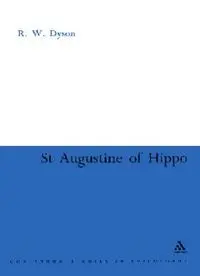
St. Augustine of Hippo: The Christian Transformation of Political Philosophy PDF
Preview St. Augustine of Hippo: The Christian Transformation of Political Philosophy
St Augustine of Hippo The Christian Transformation of Political Philosophy This page intentionally left blank St Augustine of Hippo The Christian Transformation of Political Philosophy Robert Dyson continuum Continuum International Publishing Group The Tower Building 80 Maiden Lane 11 York Road Suite 704 London New York SE1 7NX NY 10038 Robert Dyson has asserted his right under the Copyright, Designs and Patents Act, 1988, to be identified as Author of this work. Copyright © Robert Dyson, 2005 All rights reserved. No part of this publication may be reproduced or transmitted in any form or by any means, electronic or mechanical, including photocopying, recording, or any information storage or retrieval system, without prior permission in writing from the publishers. British Library Cataloguing-in-Publication Data A catalogue record for this book is available from the British Library. ISBN: 0-8264-8588-X Library of Congress Cataloguing-in-Publication Data A catalog record for this book is available from the Library of Congress. Printed and bound in Great Britain by Biddies Ltd, King's Lynn, Norfolk In memory of Wolfgang Marius von Leyden (1911-2004) Das Erste und Letzte was vom Genie gefordert wird, ist Wahrheitsliebe This page intentionally left blank CONTENTS Preface ix Introduction 1 Chapter 1: Sin, Fre Wil and Grace: The Two Cities 8 Chapter 2: The State in a Sinful World 48 Chapter 3: Private Property and Slavery 89 Chapter 4: War and Peace 116 Chapter 5: Church and State 142 Summary 180 Bibliography 187 Index 193 This page intentionally left blank PREFACE The purpose of this book is to offer, without hagiography, as com- plete an account as possible of St Augustine's social and political ideas; to do so with close reference to the primary sources; and to say nothing that is not supported by those sources. My greatest debt is to the teachers who introduced me as an un- dergraduate to the literature of Patristic and medieval thought, and who so often guided me subsequently: Gerald Bonner, Professor H. S. Offler and Henry Tudor. Another friend and teacher, Wolf- gang von Leyden, died while this book was being written. I am grateful to Iris, James and Lucie von Leyden for permission to dedi- cate it to his memory. I am indebted also to my colleagues at the University of Durham for their help and encouragement, and to the many students from whose conversation I have benefited. I thank also the editorial staff at Continuum, and especially Philip de Bary, for their technical advice and support. Mentitur qui te totum legisse fatetur, aut quis cuncta tua lector habere potest? St Isidore of Seville caused these words to be inscribed over the bookcase in the library at Seville containing Augustine's works. He lies who claims to have read all of them; who can possi- bly have done so? I certainly make no claim to have done so. Also, I have had to leave out a good deal from a work that was required to remain within a strict word limit I have struck as judicious a bal- ance as I could; but I am conscious of having dealt lightly with Augustine's relation to the other Latin Fathers, and rather one- sidedly with his influence on medieval political conceptions. Such sins of omission are unavoidable; but responsibility for them is, of course, entirely mine.
